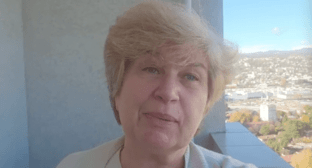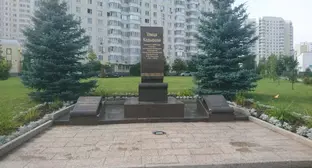18 April 2004, 21:44
To poet's death
A poet died...
...can't help thinking what if all that is prose, bad one at that?
Властью песен быть людьми могут даже змеи,
Властью песни из людей можно сделать змей
[Even snakes can be people by the power of songs,
The power of a song can make people snakes]
The village boy went to a vocational school. He worked as bricklayer - all men in his poor parts did well-paid unqualified work. He joined the services when twenty. Demobilized, he worked as assistant driller at an oil-rig. At the same time he entered the extramural department of the local philological faculty. He took the first opportunity and moved to the local book publishing house as proofreader; in ten years he headed the production unit. In those years, the romantic youth from among workers wrote verses and prose and was able to publish the collections titled "Plant a tree, people" and "Signs of the Zodiac" and the story "Time to Pay." He joined writers' unions - first the local and then the national one. Zelimkhan chaired the Fiction Propaganda Committee at the Writers' Union of the USSR in 1985-86. He became editor-in-chief of the children's magazine Raduga. In 1987-89 Zelimkhan studied at the Higher Literary Courses in Moscow.
Then the empire started to collapse, and the perestroika began. His life changed drastically - but even here his CV looks standard and averaged. Active public work. First in democratic groups and unions. Confrontation with local communist bosses reached its peak in August 1991 - the KGB even arrested him for a while that time - and ended up with the overthrowing of the nomenklatura. Coming to power followed. Being a lawmaker. Confrontation between the legislature and the executive in 1993 develops into an armed conflict, these parts' version of "Black October" [the October 1993 attack on the Russian parliament - trans.]. Again, he takes up the right position becoming the local "right-hand man" and the leader when the seat gets vacant. Now he was received in the Kremlin, now accused of grave crimes.
Everything got mixed-up next, Fortune's wheel turned and luck abandoned our hero. He lost the elections. And on Friday, February 13, he was exploded in his own white jeep.
He might be a model. An example of what a career a provincial, fairly modest and fairly ambitious, could make in the Soviet empire in the time of its decay. What senior posts could be reached in years of ruin and trouble. And - sic transit gloria mundi.
It would be all right, alright, but our hero's name was Zelimkhan. Zelimkhan Abdul-Muslimovich Yandarbiev died as a result of an attempt on his life in Doha, Qatar, on February 13, 2004. As a matter of fact, this is the only thing we know about him for sure presently.
We don't know who blew up Yandarbiev's jeep. That is, the Russian media ventured a lot of guesses, but they all boiled down to one - the event resulted from a conflict among Chechen extremists. This chorus for some reason rouses no trust. Perhaps because many of the guessers are former opponents - or actually enemies - of the prisoner of Qatar. Or perhaps because some sorting out in the separatist camp had also been discussed after another president, Jokhar Dudaev, died on April 21, 1996. Meanwhile, it became known afterwards who fired where and using what and what order they got for that...
We don't know what role this ex-president played in the past years spent in the Arab world. "He does laundry there, doesn't he!" a Chechen interlocutor swore. It turned out the late usually gave television interviews near his house, against the background of laundry getting dried...
That is, the same media more than once said Yandarbiev was a representative of Chechen separatists who collected money for warriors of Allah... and spent it on some other goals right off. This sort of "compromising materials" had become a plat du jour, though. Another question arises: whom specifically could he represent, save himself? There are a lot of such emissaries around the world. Some represent just themselves. Very serious pressure is exerted on those really authorized by Aslan Maskhadov - Ilias Akhmadov and Akhmet Zakaev. Suffice it to recollect the attempt to attain the latter's extradition when he was charged, above all, with being involved in the terrorist act in Dubrovka. The Russian party withdrew this charge by itself, another ten items or so did not pass the trial. What's to be done - they had picked the wrong subject to attack. In return, though, we now have a London judge's verdict on war in Chechnya - thanks to the Russian prosecutor's office! Meanwhile, Yandarbiev was an ideal subject to attack - after all, he seemed to have really been tapped by Russian special services talking to Movsar Baraev. Yet, there was no media campaign, no noticeable diplomatic demarches...
* * *
Zelimkhan Yandarbiev abandoned his career at the Writers' Union in the late 1980s and plunged into the Chechen national movement. The trouble was that Chechnya actually had no alternative elite. There was no dissident activity in Chechnya, unlike, for instance, in Lithuania or among the Crimean Tatars. Like in the rest of Russia, there was Soviet service "intelligentsia" - people that simultaneously were the "chiefs" and opposed the "chiefs." Many Chechens became familiar with works by their eminent tribesman Abdurakhman Avtorkhanov in samizdat [secretly printed books, magazines, etc., that were forbidden by the state in the USSR - trans.] in the 1980s, though.
However, unlike the rest of Russia, there was a different dimension here - traditionalist society institutions and family and religious relations and hierarchies. They were suitable to give up Soviet reality and oppose it, but not to change it (corruption enabled government to adapt some of these archaic elements, though). A "national movement" in the provinces could appeal to these traditionalist institutions... or to the tribesmen who achieved fame serving the center of the empire.
The latter began to be haunted by visitors. Alla Dudaeva, Jokhar Dudaev's widow, writes about Yandarbiev's visits to their house in Tartu, Estonia. It looks like those conversations were not in vain - the Major-General of the Soviet Strategic Aviation headed the Nationwide Congress of the Chechen People in November 1990. It seems he wanted sincerely to "go back to the roots." When Dudaev spoke Chechen on television, the spectators did not always understand him. In reality Jokhar's Chechen was rather poor, he started to learn the language only when he was back to Grozny. As for Ichkeria's symbol, the wolf, commonly known nowadays, officer Dudaev's wife Alla who had spent her entire life drawing in garrison clubs copied it from the well-known Akela from the Soviet cartoon. Dudaev was a neophyte. Just like artillery colonel Aslan Maskhadov was a neophyte, too. Yet in the late 1990s, this latter conscientiously tried to establish Sharia customs...
But these serious people started sincerely to develop and independent state, believing: someone knows the way it should be. Zelimkhan Yandarbiev became this sort of ideologist. Valeria Novodvorskaia wrote sympathetically, "Yandarbiev is a poet, he developed the idea of Chechnya's national independence poetically, even before Jokhar Dudaev, and he could hardly have a realistic idea about what it was - independence of a small country that was actually inside a country such as Russia." The sympathy is understandable: he was a poet of the same lofty style as Valeria Iliinichna herself.
Sergei Kovaliov was skeptical about this combination of the idealistic with the realistic, observing such movements usually involve "not the most creative ethnic intellectuals," and he added: "Have you read poet Yandarbiev's verses? I have!"
One could have an idea about this phenomenon from an issue of Molodaia Gvardia, Nash Sovremennik and similar periodicals. What remains is to be glad such men of letters preoccupied by ethnicity issues were on the fringes. One can object the "ethnic" in these examples was intertwined with the "Soviet." Yet back in Chechnya, we can find a correlation: Dudaev's second, or probably closest, ideology aide was an adviser he inherited from Chechnya's last Communist Party boss Doku Zavgaev.
* * *
Thus, it was possible to combine both these forces in the early 1990s - the society, traditionalistic to a great extent, and "service people" seeking traditions. Many Grozny residents noticed that intellectual faces disappeared from the streets after the "Chechen revolution." Instead, there was a segment of "people with arms." In 1992-93, Yandarbiev took part in talks on the settlement of relations with Russian delegations. The talks did not succeed. War became possible at first and then inevitable.
Combats began, interrupted by attempts of peaceful settlement. And, strangely enough, the military, Dudaev and Maskhadov in such contacts showed greater aspiration for peace. Maybe, because they knew the price of human blood and life well. This knowledge was apparently beyond our poet... The same used to happen in Moscow, though: KGB commandos and Pavel Grachiov were desperately unwilling to fight in 1991 and 1993, while politicians were battle-thirsty...
Some civilians, too, Akhmet Zakaev and Usman Imaev, proved to be good commanders and good diplomats. Zakaev is an actor, but as Shakespeare remarked, "All the world'sa stage, and all the men and women merely players." Akhmet and Usman just played in earnest, fusing with their roles completely. But suffice it to look at Yandarbiev's ridiculous movements at talks with Yeltsin to say: "I don't believe it!"
Yet even so, our hero can hardly be called a cruel man or his deeds evil. Thus, when Yandarbiev replaced dead Jokhar Dudaev several tens of builders kept as hostages were at once released from the dreadful concentration camp in the mountains.
However, a poet's predestination is to wake up human souls. Yandarbiev's "Islamic state" slogans were picked up by "true Muslims," "Wahhabis," and gangsters looking for an ideological cover for their trade. Arbi Baraev, Yandarbiev's bodyguard and one of the best-known abductors, was among those he woke up, too.
It's "Wahhabis" that brought the second war to Chechnya in 1999. Movladi Udugov, another Sharia ideologist, sent Yandarbiev to Afghanistan in January 2000 to establish diplomatic relations with the Taliban. Maskhadov is known to have been frenzied when he knew about that separate undertaking. It's hard to say whom our poet from that time on represented far from his homeland. It is not easy, either, to evaluate his success on the diplomatic arena. When he arrived in Islamabad, Pakistan, from Kandahar, Afghanistan, Pakistan's security forces arrested him. Then Yandarbiev settled down in Arabia... until last Friday, February 13.
* * *
There was a poet in Chechnya in the early XX cent. to whom monuments were put up and whose name was used to name streets, villages and plants. He was not celebrated as a poet, though, but as a revolution and civil war hero.
"Aslambek Sheripov is our Mayakovsky: he went to the revolution and passed away at the proper time."
Published on February 18, 2004
Author: Leonid Ruzov Source: Russian Journal




